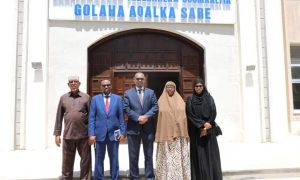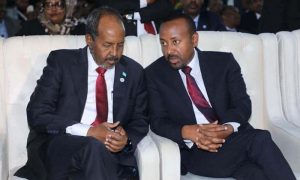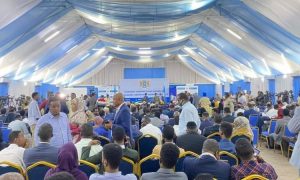

Turkish Aid – Short Gains and Long-term Dependence
Author(s): Abdi Siad Omar and Mohamed Abdulkadir Ahmed1

Introduction
The Somali Federal Government and its people are deeply in debt to, and thankful for, the unconditional support of the Turkish Government. Special thanks to President Erdoĝan for his efforts in putting Somalia back on the world map. First, his visit in August 2011 and opening the Turkish Embassy are well appreciated. Secondly, his speech at the United Nations in September 2011, completely dedicated to the cause of Somalia. Finally, President Erdoĝan’s passionate article in October 2011 titled “The Tears of Somalia”. President Erdoĝan highlighted how the global community and the world failed to support the humanitarian crises in Somalia and in the restoration of the Somali National Government. In his article, President Erdoĝan presented a roadmap and an overall comprehensive approach to help Somalia: from both a humanitarian perspective and one that focuses on building national institutions and infrastructure.
The Somali people are also thankful for the Turkish humanitarian assistance that saved the lives of nearly 260,000 people affected by the droughts from 2010-2012, and led to the restoration of important educational institutions, hospitals, roads and other essential infrastructure. Turkey’s continued contribution to the federal budget – 4.5 million dollars per month – helps build the Somali national arm and provides support to other areas in need of revamping.
Within a short period, Turkish’s development projects have achieved remarkable results and improved the quality of life in Mogadishu. This briefing note addresses important questions regarding the Turkish Aid approach: Is it a short-term gain that results in long-term dependence? To what extent does the Turkish development assistance contribute to restoring Somali public institutions?
Today, these kinds of questions are not at the forefront of discussion amongst Somali leaders because the overwhelming need for aid in the present outweighs any long-term considerations. This paper argues that despite the immediate need, it is important to reflect and take into consideration the future sustainability, ownership, institutional capacity, management and governance of these essential
infrastructures. Building roads and public infrastructure is not the end itself, but a means to achieve a broader vision such as reinstating peace and co-existence, rebuilding government capacity, the rule of law and effective governance. The Turkish’s generous assistance should not be a standalone effort, but must be closely aligned and coordinated with building effective Somali institutions.
 Turkish Development Assistance
Turkish Development Assistance
Turkish aid has achieved outstanding results in building and restoring important national infrastructure within a short period of time. In a paper of this length, it is impossible to do justice to the achievements of Turkish aid projects. The attached shows a list of key infrastructure and development projects completed by Turkish development agencies (TIKA, 2016). Turkey’s success would not be possible to achieve without the coordinated actions from a multitude of Turkish government ministries, non-governmental organizations and private sector partners (figure below).
Turkish agencies tackle Somalia’s top-priority needs from various angles in a relatively decentralized fashion, under the overall framework proposed by President Erdoĝan.
Working under the auspices of the Turkish Embassy, the Turkish Cooperation and Coordination Agency (TIKA) is the key implementing body for official assistance to Somalia. Unlike the traditional aid donors, Turkish development assistance is mainly channelled through bilateral agreements. TIKA has identified its priority projects through direct consultation with the Somali Federal Government. Once priority projects are identified, TIKA retains control over how monies are spent, ownership of tendering process and contract management. TIKA uses a comparative advantage approach to engage Turkish institutions – both public agencies and private companies – to design, implement and manage proposed development projects. Turkey’s non-government organizations are also increasingly involved in community projects such as restoring basic service infrastructure, education and agriculture development. Turkey’s business community is also gradually penetrating the Somali market, and participate in the reconstruction and management of major infrastructure projects. This business interest has paid off quickly. Turkish exports to Somalia have increased from US $8.5 million in 2008 to US $44 million in 2012 (Sucuoglu & Stearns 2016).
The Turkish government is committed to a “no stringent-attached” principle; the country welcomes engagement from the Somali government in all aspects of project planning, implementation, management and future governance. However, the current practice of long-term concession contracts to Turkish private companies or NGOs have sparked concerns over the ownership of Somalia’s essential infrastructure. Key concerns include the 50-year concession agreement to the Polytechnic University facility, and the Mogadishu International Airport; there have also been recent concerns surrounding the 20-year concession to operate and manage Mogadishu seaport. The details of these concession contracts are not available to the public and it is unknown how many of them were signed to Turkish agencies. However, this information was gathered from personal communication with Somali Government officials and politicians.

Due to the overwhelming and critical need for foreign aid, very few Somali politicians have a complete picture of the future implications of concessions. In theory, a concession approach has many advantages in bringing efficiency to public service delivery, reducing corruption, filling the gap of institutional capacity, infrastructure improvements and investment opportunities. However, many Somali Government officials and scholars have raised serious concerns over the growing practice of concession agreements to operate and manage essential public institutions.
 The following are some of the critical and overarching concerns of concession-driven development aid:
The following are some of the critical and overarching concerns of concession-driven development aid:
- Lack of transparency and accountability in concession agreements and contracts – concession documents are not made public
- Concerns of corruption and dubious activities in signing concession agreements
- Lack of overarching policy, appropriate laws and regulatory framework to ensure effective governance of concession agreements including enforcement and compliance, “sun-set
- clause” provisions, transition period and financial dividends.
- Questionable faith in the capacity for the Somali government to negotiate concession agreements in the best interests of Somali people
- Lack of appropriate laws and regulatory framework to enforce concession agreements
- Lack of consultation with affected communities, and growing anger and frustration of local communities
As a general matter, concession agreements may generate quick cash and improved service delivery. However, there are many reasons to be cautious about the continuous suitability of concession-driven development strategy. In the end, the concession agreements will reduce the ability of the Somali Government to self-govern, control and own their development vision.
Turkish Aid Delivery Approach
The Turkish Government claims their development assistance to Somalia is unique and different from the failed Western and multilateral aid delivery. Based on our observation, the Turkish model is not much different from the existing aid delivery approaches of Western donors and multilateral agencies, as well as the Chinese development assistance approach in many parts of Africa. It is common to see Turkish citizens collecting garbage, driving trucks or doing construction and labour jobs in Mogadishu, despite the overwhelming unemployment rate in the country.
Both Turkish and Western aid delivery is based on the new model of development assistance recently adopted by Western donors and multilateral agencies to ensure effectiveness of aid delivery. This new model represents a turning point to mitigate the failure of the past traditional including NGOs, private contractors, and public-private partnerships in response to weak Somali government institutions. The rationale of this approach is based on the following assumptions:
- Institutional constraints in post conflict countries such as governance, both in terms of resource management (fiscal budget management, accounting, procurement) and accountability (checks and balances, performance management, reporting, monitoring and evaluation).
 Rampant and epidemic corruption in post-conflict governments and the higher risk of aid not reaching its intended purpose and beneficiaries.
Rampant and epidemic corruption in post-conflict governments and the higher risk of aid not reaching its intended purpose and beneficiaries.- Political instability of post conflict governments and the risk of using aid for personal political gains (Interviews with retired Somali politicians confirm that a large amount of aid money was
- used to buy votes for the presidential elections).
- Lack of qualified people in post conflict situation is also one of the main reasons of using bypass aid delivery model.
In essence, this new model is concerned with mitigating the unproductive situations in which development aid goes to waste (through corruption and mismanagement). However, a possible negative result is that governments are left out of the implementation of aid projects and delivery. In the case of Tanzania, aid is channeled through bilateral government-to government interaction; due to its management and governance capacity, the Tanzanian government is trusted with the implementation of aid projects. In contrast, in Haiti and Somalia, aid is channeled through non-government actors and government institutions are not engaged at all in the implementation process.
The table below provides a brief description of the different mechanisms of bypass aid delivery. Both Turkish and Multilateral organizations are currently using these methods to deliver aid in Somalia:

Seemingly, Somali Government involvement is limited. No doubt, the bypass model has produced much needed results very quickly, and has resulted in improved basic service delivery. However, whether the bypass model, rather than building Somali institutional capacity, produces long-term sustainable solutions and efficient aid delivery remains to be seen. In the meantime, the following unintended consequences are observable:
- Uncoordinated aid delivery efforts and possible risk of duplications.
- Lack of trust on behalf of the donors towards the Somali Government
- May create dual public sectors to deliver basic goods and services
- May undermine the national government’s authority to control, own and implement their development vision
- Donors retain control over aid funds and allocate where they deemed necessary
- Donors, UN agencies and World Bank promoting conflict of roles, responsibilities and constitutional mandate between governments at the Federal and State levels.
- Lack of employment benefit for Somali citizens and tremendous opportunities for foreign nationals
- Long-term dependency on organizations that are independent development actors.
In conclusion, both Turkish and multilateral agencies have the right to demand their aid funds are well-spent and achieve their intended purpose. Although the bypass-aid delivery model may have long-term unintended consequences, the onus is on the Somali government to build effective governance capacity and ultimately gain the trust and confidence of all donors. The Somali government must have constructive dialogue with all donors and build “go-post” targets to shift from bypass-aid delivery to well-coordinated and aligned development actions. Ultimately, while donors are here to support efforts, the Somali government and its people must be responsible for their own development vision and goals.
Good governance remains the critical ingredient to gain the support of international donors. The era of aid mismanagement and personal pocketing is over. International donors have repeatedly stressed that good governance is a prerequisite for effective development cooperation and sustainable aid support. Conversely, donor communities are committed to standalone actions to implement reconstruction programs and restore basic services to vulnerable communities, without engaging the national government.
Merely establishing formal government institutions does not guarantee that effective policies are developed and implemented by government employees. It is essential to integrate institutional building with enhanced skills and capabilities of employees and political leadership. What can the Somali government do to build a credible and effective governance system? The following are some suggestions:
- Develop and implement clear, rigorous and zero-tolerance corruption policies. Corruption is the key factor of undermining the government’s credibility.
- Building effective leadership. Good governance depends critically on leaders in key government ministries who can articulate a vision for their domain, and can translate this vision into effective programs.
- Building effective public financial management, control and audit systems to ensure accountability and confidence.
- Attract and engage qualified and motivated staff, rather than tribal bias.
- Separate policymaking and policy implementation functions of the government. This is a crucial element for good governance. The Minister’s role should be limited to policy making function, while the Director General of the Ministry should strive on how to implement policies.
- The Federal Government Ministries roles and responsibilities need to be clarified with specific terms of reference. In fact, most of them work beyond their constitutional and legitimate mandate. We are witnessing unprecedented violation of mandates.
- Training to build the capacity of middle managers within the public institutions to ensure effective and efficient service delivery.
- Conduct more specific training: training that is specifically designed to improve corporate governance including human resource management practices, financial management, procurements, reporting, monitoring and evaluation.
- Promote culture of good governance, such as public service values of integrity, accountability, responsibility and excellence.
The Somali National Development Plan is a good starting point to build a strategic framework and strengthen collaboration with international donors. However, the development plan should focus on strategic and political processes. This paper affirms that it is essential to improve the governance capacity at an institutional level. Capable and skilled employees are critical to achieving the goals of the national development plan and the ability to collaborate with international donors.

References
Dietrich, S. (2011), Bypass or Engage? Explaining Donor Delivery Tactics in Foreign Aid Allocation, Princeton University. http://simone-dietrich.com/content_images/file/ISQsubmission72811_2(1)
Sucuoglu G. & Jason Stearns, J. (2016), Turkey in Somalia: Shifting Paradigms of Aid. Research Report #24, November 2016. South African Institute of International Affairs (SAI-IA).
TIKA, (2016), ‘Somalia Report’, 2016, http://www.tika.gov.tr/en/publication/-25097.
TIKA , (2015), Turkish Development Assistance Report 2015.
1 Both authors are Professional Architects and Urban, Regional and Resource Planners.
2 Somalia is the only country that didn’t ratify the UNESCO World Heritage Convention. We hope that the present government and the new Mayor of Mogadishu take an immediate action to bring the Country back to the World of Communities.

.
.
Xafiiska Wararka Qaranimo Online | Muqdisho
___________________________________________________
_____________________________________________________________________________________
Xafiiska Wararka Qaranimo Online | Mogadishu, Somalia
_____________________________________________________________________________________Advertisement
_____________________________________________________________________________________







